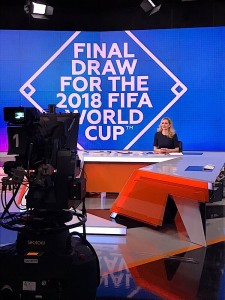
Top Draw: Russia, England and the 30 other finalists found out their group opponents for the World Cup
After the draw for the World Cup was announced at the Kremlin on December 1st, Russia had 195 days to prepare for group games against Saudi Arabia, Egypt and Uruguay. Stanislav Cherchesov’s team had been set a target of the last four, and were optimistic.
Bizarrely, due to the hosts’ lack of competitive matches, the draw also meant the tournament opener will be between the two lowest FIFA-ranked teams: the 65th-placed Russians against the 63rd-placed Saudis. The only way is up.
The following day, with the winter break imminent, there was just time to see some Russia stars in action as league leaders Lokomotiv Moscow hosted Rubin Kazan. I envisaged the Miranchuk twins versus Maksim Kanunnikov in a chilly thriller.
It wasn’t. Rubin edged a dire clash, while Loko’s stars weren’t Russian: Fernandes, Farfan – and Eder, who replaced Anton Miranchuk at half-time. After 80 long minutes, Rubin’s Navas saw red, and Farfan headed in a last-gasp Loko winner to send them six points clear. A positive end to a pre-Christmas turkey.
Roll back to the State Palace, and England had been handed an almost ideal draw against Tunisia, Panama and Belgium. Officials and journalists who had stayed on for the weekend in Moscow then watched the English Premier League’s top two in pubs and bars on Russian TV. What a contrast.
Manchester United’s 3-1 win at Arsenal was a classic. Manchester City’s late comeback against battling West Ham was no less gripping. The gap between England’s top flight and Russia’s seemed a chasm. If the bookmakers made England 25-1 to win the World Cup, Russia’s semi-final target seemed like a lottery win – and a ticket more likely held by Gareth Southgate.
But, of course, one match does not a league represent. And one team does not represent a nation. Manchester United’s line-up included three Englishmen, as did City’s. West Ham fielded two. Arsenal had none.
In contrast, Russia’s quota system means there must be five Russians on the pitch at any one time. Thus, Loko v Rubin contained the same amount of native players as four English teams. In total that weekend, 20 English teams fielded 69 English players, or an average of almost 3.5 per team.
The numbers also decline at the top. Aside from City, United and Arsenal, Chelsea fielded one English player and Liverpool three. Yet at the bottom, Bournemouth picked seven and West Brom six.
Simply put, there are over a third more Russian players in their own league than there are Englishmen in theirs. Even fewer English players reach the pinnacle of any other European league. And none of the English team play outside the Premier League.
On the same weekend, German league leaders Bayern Munich lined up with five Germans, while Spain’s top team Barcelona also picked five Spaniards.
The Russians argue that the best way to boost their national team is to guarantee enough natives first-team places. Unhampered by EU employment restrictions, the Russian Football Union set the number at five to ensure a balance between native protection and foreign imports.
Yet opponents say the only people who benefit from the quota system are agents. They claim it renders the league uncompetitive, and development and progress stagnate as players are picked for passport over talent.
To fill the numbers, average Russian players can demand overinflated wages, also killing the desire for either self-improvement or to leave Russia for more challenging leagues. Ironically, some critics would welcome the departure of Krasnodar striker Fyodor Smolov or Alexey Miranchuk to one of Europe’s top five leagues as it would smack of ambition.
On the flip side, sceptics also say the quota repels good foreign players. They want it scrapped and more cohesive recruitment, development and investment in local youth.
This is an area where England can claim real success. Following the example set by Spain and Germany, looking to the next generation has resulted in England winning the Under-20s and Under-17s World Cups, Toulon Tournament and the Under-19s European championship, as well as reaching two European finals.
Such a plethora of talent has led to two inevitable questions: will the Young Lions step up and play in the Premier League – or other top European leagues – and can they replicate their success at senior level?
Russia can ask a similar question. Their Under-21 teams have struggled, but the Under-19s have sparkled. At the 2015 European Championships, the Russians were runners-up to Spain, whom they had beaten in the group stage.
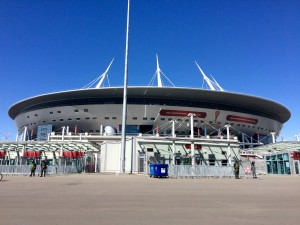
Bright Prospects: could the success of England’s – and Russia’s – youth teams soon mean a World Cup last-four spot is a minimum target?
FC Krasnodar owner Sergey Galitskiy has also produced a revolution. After swiftly taking his brand new club from Russia’s third tier to the top flight, the self-made retail billionaire not only invested $460m in building a superb stadium – nicknamed the Galiseum – but also a state-of-the-art youth academy.
The latter wasn’t prompted by the quota, but Galitskiy’s sense of social duty. He also thinks it’s easier and cheaper to develop a player in your own system, and with your own philosophy, than to buy one. His dream is to see 11 players from his academy playing for Krasnodar. Skilful midfielder Ilya Zhigulyov was the first to make his Russian Premier League debut and more are expected.
A Youth League record crowd of 32,510 at the Galiseum watched Krasnodar’s Under-19s host Real Madrid’s in their play-off on February 7th, the hosts eventually losing 3-0 on penalties after a goalless draw.
Krasnodar’s senior team are fourth in Russia’s top flight, and in contention for a fourth straight Europa League spot, with less than a month to go in the winter break. And this leads to a perennial debate that has again been raised.
England doesn’t have a break, to the exasperation of mainly foreign managers, and to the delight of fans and club coffers. However, the Premier League now says it is considering introducing a winter break when the next television rights deal is agreed for 2019-2022.
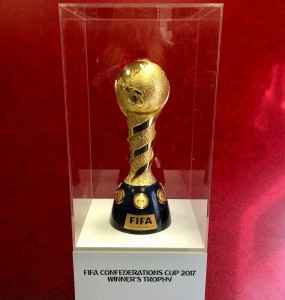
Germany On Top: the world no.1 team won the Confederations Cup curtain raiser and are tipped to retain the World Cup
Germany, Spain, Italy and France – who have all won a major tournament in the last two decades – all take time off, along with Russia, who reached the semi-finals of Euro 2008. While England apparently turn up to tournaments burned out or injured, June’s sport headlines heavy with “doubts” and “metatarsals”.
There are just over four months to go until the opener at the Luzhniki Stadium. In between there will be domestic and European competitions, and international friendlies. There will be bans, injuries and dips in form, as well as surprise packages and popular choices. There’s a long way to go yet.
World number ones Germany won last year’s Confederations Cup in St. Petersburg, to the surprise of many pundits who had tipped Chile, who miss out this summer.
Joachim Loew’s men are the favourites this time. Fans in England and Russia will be hoping there will be another surprise, come the main event.
You can follow Kate on Twitter @KatePartridge33. Many thanks to Konstantin Potapov for his contributions

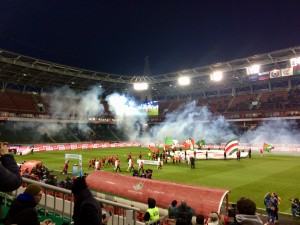
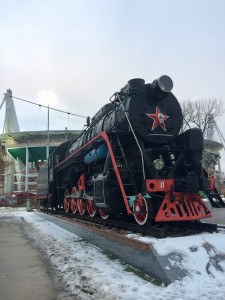
Comments are closed.